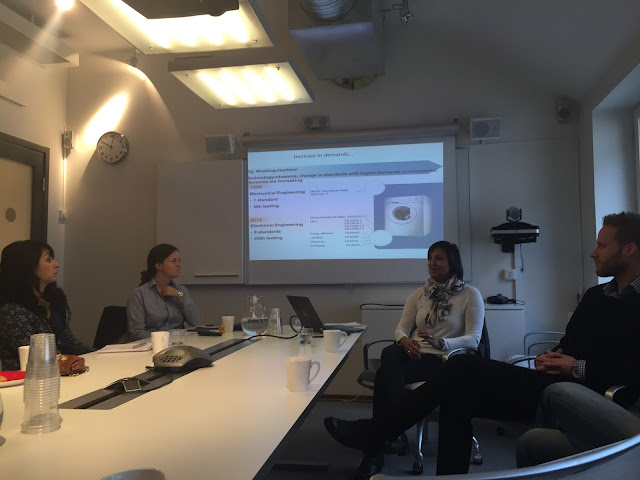The last day of the delegation started with an introduction to private health insurance in Rwanda, by the Rwanda Health Insurers Association. 93% of the population is covered by the public health insurance, but there are a few private health insurance companies as well. For them, the three main challenges are to mitigate fraud, to increase the level of training in management of health insurance and to improve systems and software for monitoring of the patient network. The existing open health information management system is only for epidemiology and statistical purposes and not for patient journals, management or administration.
The day's big event was the workshop organized in collaboration with Rwanda Biomedical Center (RBC), a government agency assuring the implementation of the government's plans and policies; and Rwanda Development Board (RDB) - the national one-stop shop for investment and establishment of business in the country.
The workshop was opened by Chargé d'Affaires Maria Håkansson, the Permanent Secretary of the MoH, Dr Solange Hakiba and the Swedish State Secretary Agneta Karlsson. The three ladies all talked about this being not the first but the second step (as it's the second health care delegation to Rwanda) on a journey of new relations between Sweden and Rwanda, and about the importance of private and public sector collaboration. The PS mentioned that there are gaps in tertiary care and super specialities such as diagnostic services, cardiology, oncology and nephrology, where the private sector could join forces with the public.
The General Director of RBC James Kamanzi expressed the hope that we would see great partnerships and concrete business as a result of the workshop, while Hubert Ruzibiza of RDB explained what business opportunities there are within health care, such as pharma, advanced equipment for medical tourism and specialty services.
After a nice coffee break outside the conference room, we split into groups, where the Rwandan participants were matched with the Swedish companies. The groups had interesting discussions on the topics of NCDs, health care infrastructure and maternal and child health, and the Swedish solutions were presented in more detail. The workshop ended with a nice buffet lunch.
After that, the delegation visited the Independent University of Kigali, which is just about to start construction of a Medical School, a 388-bed teaching hospital and a 245-bed superspecialty hospital. Excavation has started, construction is expected to start at the beginning of next year and the buildings will be finished in 3 years. Of course this means that equipment, IT systems etc have to be procured - an opportunity worth looking further into.
During the wrap-up meeting at the Embassy, Swecare got valuable feed-back on what has worked well during the delegation but also some ideas for improvement, such as letting first-time participants listen to tips and tricks from more seasoned delegates during the intro meeting.
The very last part of the program was an innovation pub hosted by Swedish company Globhe, coordinator of global health security projects, at the Impact Hub Kigali - a fun way to finish the delegation! So thank you, Kigali, until next time - murakoze!


























